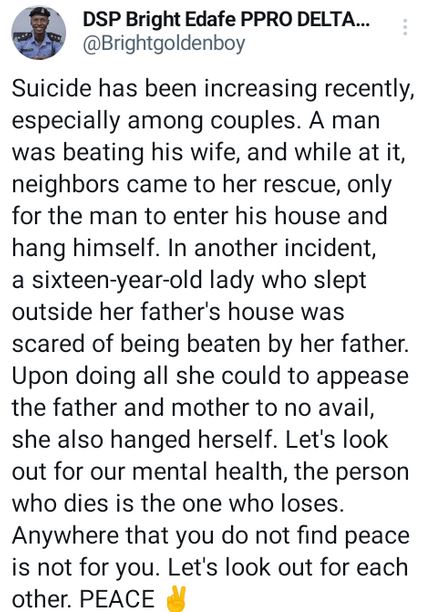Reports of suicide are featuring with dreadful frequency across the country, adding to the prevailing general misery. Many Nigerians were heartbroken when the Edo State Police Command confirmed the death by suicide of Toluige Olokoobi, who became a social media sensation via a video where her son whom she was reprimanding, asked her repeatedly to ‘calm down.’ But there are many more reported cases of self-murder and attempts nationwide. This trend presents another challenge for the government, social organisations, and families.
Olokoobi reportedly took her own life in the presence of her one-year-old child, leaving behind three kids. Neighbours said she had recently been battling depression.
A Nigerian Army captain, Alphonsus Bazza, also reportedly hanged himself in Uyo, Akwa Ibom State, leaving behind a wife and a child. In Abuja, 29-year-old Terver Orfega committed suicide by swallowing a lethal chemical early this month, reportedly after a business failure and inability to repay a loan.
Last month, the Bauchi State Police Command reported that Betwom Bitrus, 17, of Bombar, Bogoro Local Government Area, hanged himself after telling his family he was heading for a stream to take a bath.
Two cases gained media traction in July: a 72-year-old resident of Ede, Osun State, Kareem Aderemi, shot himself with a twin-barrelled gun; and in Anambra State, a young pastor, Prosper Igboke, allegedly jumped to his death from a multi-storey building in Nnewi, ostensibly after a failed romance. Security personnel said Aderemi had been struggling with partial blindness, and depression.
A video post went viral in August showing passers-by physically restraining a Lagos socialite, Fareeda Abdulkabir, from jumping off the Third Mainland Bridge into the lagoon, while, amid tears, she poured out her marital frustration.
In 2022, 79 persons died by suicide in Nigeria, according to The PUNCH. Lagos ranked highest with 12 cases; followed by Oyo 10; Kano, four; while Anambra, Edo, Delta, Ogun, and Rivers recorded three each. Experts say some cases are never reported.
Likewise, DSP Bright Edafe, the spokesperson of the Delta State Police Command, took to the social media to raise alarm over the increasing rate of suicide, especially among couples.
He urged everyone to take care of their mental health because a person who takes his/her life has missed out on what life has to offer.
The PRO stated this on Wednesday, November 15, after a man and a 16-year-old girl committed suicide over domestic issues.
“Suicide has been increasing recently, especially among couples. A man was beating his wife, and while at it, neighbors came to her rescue, only for the man to enter his house and hang himself,” he wrote.
“In another incident, a sixteen-year-old lady who slept outside her father’s house was scared of being beaten by her father. Upon doing all she could to appease the father and mother to no avail, she also hanged herself.
“Let’s look out for our mental health, the person who dies is the one who loses. Anywhere that you do not find peace is not for you. Let’s look out for each other. PEACE.”

Frustration in the land, say experts, is affecting people’s mental health. With joblessness, poverty, hunger, insecurity, and uncaring governance prevalent, many Nigerians slip easily into depression, and some contemplate suicide.
Suicide, says the World Health Organisation, is the fourth leading cause of death among 15-29-year-olds globally. Over 703,000 persons commit suicide worldwide each year, with the most common means being ingestion of pesticides, hanging, and firearms. The frequency of suicides by its ingestion once prompted the Nigerian government to briefly curtail the sale of the Sniper pesticide brand.
Social workers also say the breakdown of traditional family values, drug abuse, cultism, mental ill-health, and bullying, can lead to depression and eventually, suicide.
Undiagnosed mental health is also potent, says the Association of Psychiatrists in Nigeria, which disclosed that over 60 million Nigerians live with various degrees of mental ill-health. It further lamented that there were only about 200 mental health experts available in the country.
Experts say suicidal feelings can affect anyone of any age, gender, or background, and at any time. Feelings of hopelessness, worthlessness, and frustration can graduate to depression. Parents, families, friends, and communities are therefore advised to pay attention to all persons around them.
But the WHO insists that suicides are preventable, and recommends limiting access to their means – pesticides, firearms, and poisons; identify and monitor persons exhibiting suicidal behaviour, and interact with the media for responsible reporting.
CSOs want the government to decriminalise attempted suicide; the suicidal need care, not punishment.
Government and all levels, communities, families, and faith-based organisations should collaborate to bring down suicide levels.
Ibe Ikwechegh, a legal practitioner and consultant with Indent holds that: “At the centre of most suicide is depression. Yet depression only in the eyes of the law may not meet the threshold of insanity, enough to provide exculpation. But depression is as bad as insanity, depriving us of the volition to sound judgment….Suicidal instinct longs for love, for emotion, for genuine human sympathy, for touch, for a heart to heart talk and understanding which cannot be provided for by criminalizing it….
“Our punitive law for attempted suicide does not square up well with our criminal justice theory of punishment. It does not protect society since no one else is supposedly at risk except the attempter who is both the criminal and the victim. There is no evidence that it deters future attempt….”
Credits: PUNCH Editorial with additional reports from Tori.ng/Law & Society Magazine





